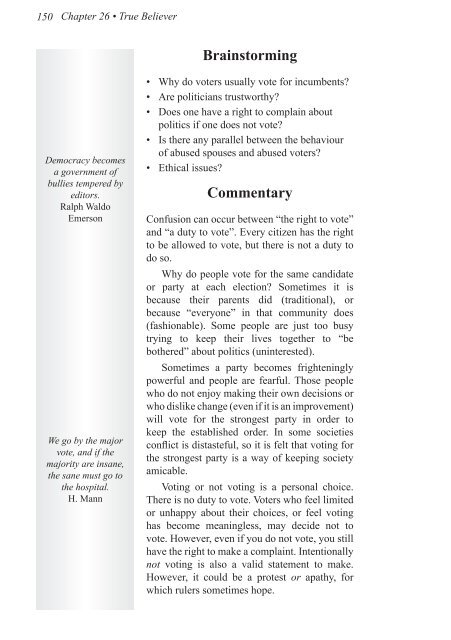The Adventures of Jonathan Gullible - Bastiat Institute
The Adventures of Jonathan Gullible - Bastiat Institute
The Adventures of Jonathan Gullible - Bastiat Institute
You also want an ePaper? Increase the reach of your titles
YUMPU automatically turns print PDFs into web optimized ePapers that Google loves.
150 Chapter 26 • True Believer<br />
Democracy becomes<br />
a government <strong>of</strong><br />
bullies tempered by<br />
editors.<br />
Ralph Waldo<br />
Emerson<br />
We go by the major<br />
vote, and if the<br />
majority are insane,<br />
the sane must go to<br />
the hospital.<br />
H. Mann<br />
Brainstorming<br />
• Why do voters usually vote for incumbents?<br />
• Are politicians trustworthy?<br />
• Does one have a right to complain about<br />
politics if one does not vote?<br />
• Is there any parallel between the behaviour<br />
<strong>of</strong> abused spouses and abused voters?<br />
• Ethical issues?<br />
Commentary<br />
Confusion can occur between “the right to vote”<br />
and “a duty to vote”. Every citizen has the right<br />
to be allowed to vote, but there is not a duty to<br />
do so.<br />
Why do people vote for the same candidate<br />
or party at each election? Sometimes it is<br />
because their parents did (traditional), or<br />
because “everyone” in that community does<br />
(fashionable). Some people are just too busy<br />
trying to keep their lives together to “be<br />
bothered” about politics (uninterested).<br />
Sometimes a party becomes frighteningly<br />
powerful and people are fearful. Those people<br />
who do not enjoy making their own decisions or<br />
who dislike change (even if it is an improvement)<br />
will vote for the strongest party in order to<br />
keep the established order. In some societies<br />
confl ict is distasteful, so it is felt that voting for<br />
the strongest party is a way <strong>of</strong> keeping society<br />
amicable.<br />
Voting or not voting is a personal choice.<br />
<strong>The</strong>re is no duty to vote. Voters who feel limited<br />
or unhappy about their choices, or feel voting<br />
has become meaningless, may decide not to<br />
vote. However, even if you do not vote, you still<br />
have the right to make a complaint. Intentionally<br />
not voting is also a valid statement to make.<br />
However, it could be a protest or apathy, for<br />
which rulers sometimes hope.





![[June 2008, Volume V Quarterly Issue] Pdf File size - The IIPM Think ...](https://img.yumpu.com/31747104/1/190x245/june-2008-volume-v-quarterly-issue-pdf-file-size-the-iipm-think-.jpg?quality=85)
